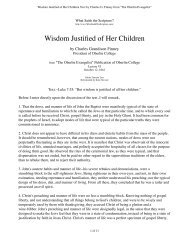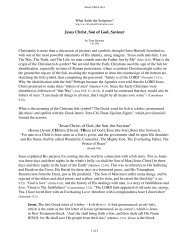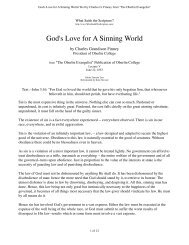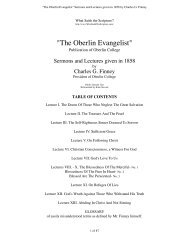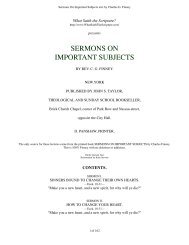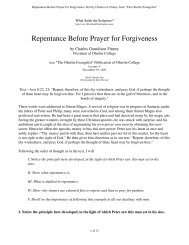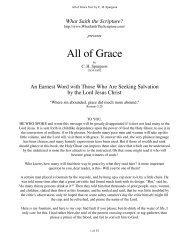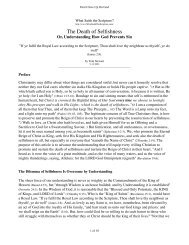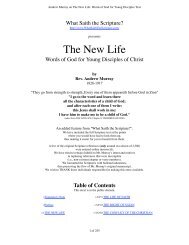The Heart of the Gospel text by AT Pierson - What Saith The Scripture?
The Heart of the Gospel text by AT Pierson - What Saith The Scripture?
The Heart of the Gospel text by AT Pierson - What Saith The Scripture?
Create successful ePaper yourself
Turn your PDF publications into a flip-book with our unique Google optimized e-Paper software.
<strong>The</strong> <strong>Heart</strong> <strong>of</strong> <strong>the</strong> <strong>Gospel</strong> <strong>text</strong> <strong>by</strong> A. T. <strong>Pierson</strong><br />
<strong>What</strong> <strong>Saith</strong> <strong>the</strong> <strong>Scripture</strong>?<br />
http://www.<strong>What</strong><strong>Saith</strong><strong>The</strong><strong>Scripture</strong>.com/<br />
presents<br />
THE HEART OF THE GOSPEL<br />
One <strong>of</strong> twelve sermons from <strong>the</strong> book bearing <strong>the</strong> same title.<br />
DELIVERED <strong>AT</strong> THE<br />
METROPOLITAN TABERNACLE,<br />
IN THE AUTUMN OF 1891.<br />
BY<br />
ARTHUR T. PIERSON, D.D.<br />
London:<br />
PASSMORE AND ALABASTER,<br />
P<strong>AT</strong>ERNOSTER BUILDINGS, E.C.<br />
Prefatory Note.<br />
To <strong>the</strong> Memory<br />
<strong>of</strong><br />
CHARLES HADDON SPURGEON,<br />
TH<strong>AT</strong> VALIANT SOLDIER OF THE CROSS,<br />
WHO FOR FORTY YEARS WIELDED WITH SUCH POWER<br />
THE SWORD OF THE SPIRIT, WHICH IS THE WORD OF GOD,<br />
AND BRAVELY BORE THE BANNER OF THE CROSS<br />
UNTIL IT FELL FROM HIS DYING GRASP,<br />
THIS VOLUME OF SERMONS,<br />
WHICH REPRESENTS A HUMBLE EFFORT<br />
TO PERPETU<strong>AT</strong>E HIS TESTIMONY TO THE SAME OLD GOSPEL,<br />
IS MOST LOVINGLY DEDIC<strong>AT</strong>ED.<br />
"THIS book aspires to no pre-eminence as furnishing homiletic models.<br />
Twelve sermons are here put in print, which were preached in <strong>the</strong> Metropolitan<br />
1 <strong>of</strong> 10
<strong>The</strong> <strong>Heart</strong> <strong>of</strong> <strong>the</strong> <strong>Gospel</strong> <strong>text</strong> <strong>by</strong> A. T. <strong>Pierson</strong><br />
Tabernacle, London, in <strong>the</strong> Autumn <strong>of</strong> 1891, while Pastor C. H. Spurgeon was seeking<br />
recovered health at Mentone. <strong>The</strong>y were never written, even in part, and are reproduced<br />
almost verbatim.<br />
If any interest invests <strong>the</strong>m, it is almost wholly circumstantial, owing to <strong>the</strong> unique<br />
conditions under which <strong>the</strong>y were spoken. Many and marked as are <strong>the</strong>ir defects, it<br />
pleased God, in a remarkable degree, to use <strong>the</strong>m both to convert sinners and confirm<br />
saints.<br />
<strong>The</strong>re was a call for <strong>the</strong>ir publication, and it was so general that it was thought best not to<br />
disregard it, and it is devoutly hoped that He, for Whose sake <strong>the</strong>y were prepared and<br />
preached, may have even yet some fur<strong>the</strong>r errand for <strong>the</strong>m to accomplish. With this<br />
prayer, <strong>the</strong>y are sent forth in His name." --Arthur T. <strong>Pierson</strong>.<br />
METROPOLITAN TABERNACLE,<br />
LONDON, JUNE, 1892.<br />
Introduction.<br />
SERMON NUMBER TWO<br />
<strong>The</strong> <strong>Heart</strong> <strong>of</strong> <strong>the</strong> <strong>Gospel</strong>.<br />
"For God so loved <strong>the</strong> world, that He gave His only begotten Son,<br />
that whosoever believeth in Him<br />
should not perish, but have Everlasting Life"<br />
(John 3:16).<br />
THERE is one <strong>text</strong> in <strong>the</strong> New Testament that has been preached from <strong>of</strong>tener than any o<strong>the</strong>r in <strong>the</strong><br />
Bible. It has been <strong>the</strong> foundation <strong>of</strong> great revivals <strong>of</strong> religion, like that among <strong>the</strong> Tahitians; or that<br />
among <strong>the</strong> Telugus in India, where 2,222 people were baptized in one day, nearly 5,000 people in<br />
thirty days, and 10,000 people within ten months; and where, even during <strong>the</strong> year drawing to its<br />
close, nearly 10,000 more souls have been baptized. It is a wonderful <strong>text</strong>. Lu<strong>the</strong>r called it one <strong>of</strong> "<strong>the</strong><br />
little gospels." It is this (John 3:16): "For God so loved <strong>the</strong> world, that He gave His only begotten Son,<br />
that whosoever believeth in Him should not perish, but have Everlasting Life."<br />
You will naturally wonder what <strong>the</strong>re is in that old <strong>text</strong> that is new. I have found something that was<br />
very new to me, and which also may be to you. I suppose that I had read that verse tens <strong>of</strong> thousands<br />
<strong>of</strong> times, and yet, a little while ago, as I was led to preach upon that <strong>text</strong>, I sought <strong>of</strong> <strong>the</strong> Lord a clearer<br />
view <strong>of</strong> it, that I might glorify Him, <strong>by</strong> bringing forth out <strong>of</strong> His treasure things new and old. After<br />
reading <strong>the</strong>se familiar words over, perhaps a hundred times, prayerfully asking for new light and<br />
insight, <strong>the</strong>re suddenly came to me this absolutely new discovery, as though one, looking up into <strong>the</strong><br />
heavens, should see a cloud swept away from before <strong>the</strong> stars, and a new constellation revealed. It<br />
flashed on my thought that <strong>the</strong>re are ten words in <strong>the</strong> verse that are quite prominent words, such as<br />
2 <strong>of</strong> 10
<strong>The</strong> <strong>Heart</strong> <strong>of</strong> <strong>the</strong> <strong>Gospel</strong> <strong>text</strong> <strong>by</strong> A. T. <strong>Pierson</strong><br />
"God," "loved," "world," "whosoever," and so on. <strong>The</strong>n a little more close and careful search showed<br />
those words in a hi<strong>the</strong>rto undiscovered mutual relation: <strong>the</strong> ten words were in five pairs. <strong>The</strong>re is one<br />
pair <strong>of</strong> words that has to do with <strong>the</strong> two persons <strong>of</strong> <strong>the</strong> Godhead-- God <strong>the</strong> Fa<strong>the</strong>r, and God <strong>the</strong> Son.<br />
<strong>The</strong>re is a second pair <strong>of</strong> words that has to do with <strong>the</strong> expression <strong>of</strong> <strong>the</strong> Fa<strong>the</strong>r's attitude or posture<br />
towards this world-- He "loved" and He "gave." <strong>The</strong>n <strong>the</strong>re is a third pair <strong>of</strong> words that refers to <strong>the</strong><br />
objects <strong>of</strong> <strong>the</strong> divine love-- "world" and "whosoever." <strong>The</strong>n <strong>the</strong>re is a fourth pair <strong>of</strong> words that shows<br />
us what <strong>the</strong> attitude <strong>of</strong> man ought to be when God's love and gift come to his knowledge-- "believe"<br />
and "have." <strong>The</strong>n <strong>the</strong> last pair <strong>of</strong> words points us to <strong>the</strong> extremes <strong>of</strong> human destiny: <strong>the</strong> result <strong>of</strong><br />
rejection, and <strong>the</strong> result <strong>of</strong> acceptance-- "perish" and "life."<br />
Often as I had read this "gospel in a sentence," I had never seen before that singular relation borne <strong>by</strong><br />
<strong>the</strong> main words in <strong>the</strong> sentence; and, so far as I know, nobody else had seen it before; for it is one <strong>of</strong><br />
<strong>the</strong> beautiful privileges about <strong>the</strong> study <strong>of</strong> <strong>the</strong> precious Word <strong>of</strong> God that <strong>the</strong> humblest believer who<br />
asks <strong>the</strong> grace <strong>of</strong> God and <strong>the</strong> guidance <strong>of</strong> <strong>the</strong> Holy Spirit in studying <strong>the</strong> Holy <strong>Scripture</strong>s, may make<br />
a discovery for himself that nobody has ever made before, or if so, without his knowledge; so that it is<br />
still his own discovery.<br />
Let us look at this <strong>text</strong> in <strong>the</strong> light <strong>of</strong> this fresh arrangement <strong>of</strong> <strong>the</strong> thoughts which it contains. To my<br />
mind, it is one <strong>of</strong> <strong>the</strong> most remarkable discoveries that it has ever been permitted me to make in <strong>the</strong><br />
study and exploration <strong>of</strong> <strong>the</strong> hidden treasures <strong>of</strong> <strong>the</strong> Word <strong>of</strong> God.<br />
I. In <strong>the</strong> first place, "God so loved <strong>the</strong> world, that He gave His only begotten Son." <strong>The</strong>re are two<br />
<strong>of</strong> <strong>the</strong> persons <strong>of</strong> <strong>the</strong> Godhead. Many persons are troubled about <strong>the</strong> relation <strong>of</strong> <strong>the</strong> Fa<strong>the</strong>r to <strong>the</strong> Son,<br />
and <strong>of</strong> <strong>the</strong> Son to <strong>the</strong> Fa<strong>the</strong>r. <strong>The</strong>y cannot exactly see how Jesus Christ can be equal with God if He is<br />
God's Son; and <strong>the</strong>y cannot see how He can be as glorious as <strong>the</strong> Fa<strong>the</strong>r, and how He can be entitled<br />
to <strong>the</strong> same honor and homage and worship as <strong>the</strong> Fa<strong>the</strong>r if He proceeds forth from <strong>the</strong> Fa<strong>the</strong>r, and<br />
comes into <strong>the</strong> world.<br />
But let us seek a simple illustration. It is said, in <strong>the</strong> introduction <strong>of</strong> this <strong>Gospel</strong> according to John, "In<br />
<strong>the</strong> beginning was <strong>the</strong> Word, and <strong>the</strong> Word was with God, and <strong>the</strong> Word was God." [John 1:1] <strong>What</strong> is a<br />
word? It is <strong>the</strong> expression <strong>of</strong> a thought that lies in <strong>the</strong> mind. <strong>The</strong> thought is not visible, <strong>the</strong> thought is<br />
not audible; but, when it takes <strong>the</strong> form <strong>of</strong> a spoken word or a written word, that thought that was<br />
invisible in <strong>the</strong> mind, that you could not see, or hear, or know about in any o<strong>the</strong>r way, comes to your<br />
eye on <strong>the</strong> printed page, or to your ear through <strong>the</strong> voice <strong>of</strong> <strong>the</strong> speaker. And so my invisible thoughts<br />
are coming to you now through <strong>the</strong>se audible words. <strong>The</strong> word is so connected with <strong>the</strong> thought that it<br />
is <strong>the</strong> expression <strong>of</strong> <strong>the</strong> thought. <strong>The</strong> thought is <strong>the</strong> word invisible: <strong>the</strong> word is <strong>the</strong> thought visible.<br />
Now Jesus Christ was <strong>the</strong> invisible thought <strong>of</strong> God put into a form in which you could see it and hear<br />
it; and just as <strong>the</strong> word and <strong>the</strong> thought are so connected that if you understand <strong>the</strong> word you<br />
understand <strong>the</strong> thought, and if you understand <strong>the</strong> thought you understand <strong>the</strong> word; and as <strong>the</strong> word<br />
would have no meaning without <strong>the</strong> thought, and <strong>the</strong> thought no expression without <strong>the</strong> word, so<br />
Jesus Christ helps us to understand <strong>the</strong> Fa<strong>the</strong>r, and <strong>the</strong> Fa<strong>the</strong>r could not make Himself perfectly<br />
known to us except through <strong>the</strong> Son. But, again, we are told that Christ is "<strong>the</strong> Light <strong>of</strong> <strong>the</strong> world."<br />
[John 8:12] Suppose I should say, "In <strong>the</strong> beginning" was <strong>the</strong> light, and <strong>the</strong> light was with <strong>the</strong> sun, and<br />
3 <strong>of</strong> 10
<strong>The</strong> <strong>Heart</strong> <strong>of</strong> <strong>the</strong> <strong>Gospel</strong> <strong>text</strong> <strong>by</strong> A. T. <strong>Pierson</strong><br />
<strong>the</strong> light was <strong>the</strong> sun. <strong>The</strong> sun sends forth <strong>the</strong> light, and <strong>the</strong> light proceeds from <strong>the</strong> sun; yet <strong>the</strong> light<br />
and <strong>the</strong> sun are <strong>the</strong> same in nature and <strong>the</strong> same in essence, and <strong>the</strong> glory <strong>of</strong> <strong>the</strong> sun is <strong>the</strong> glory <strong>of</strong> <strong>the</strong><br />
light, and <strong>the</strong> glory <strong>of</strong> <strong>the</strong> light is <strong>the</strong> glory <strong>of</strong> <strong>the</strong> sun; and although <strong>the</strong> light goes forth from <strong>the</strong> sun,<br />
it is equal with <strong>the</strong> sun, shares <strong>the</strong> same glory, and is entitled to <strong>the</strong> same valuation. We cannot think<br />
<strong>of</strong> <strong>the</strong> one without <strong>the</strong> o<strong>the</strong>r.<br />
In this <strong>text</strong> not a word is said about <strong>the</strong> love <strong>of</strong> <strong>the</strong> Son for sinners, nor a word about <strong>the</strong> Son's <strong>of</strong>fering<br />
<strong>of</strong> Himself for <strong>the</strong> Salvation <strong>of</strong> men. <strong>What</strong> is <strong>the</strong> common, old-fashioned notion that we sometimes<br />
find cropping up even in <strong>the</strong> conceptions <strong>of</strong> Christian people as well as unbelievers, in <strong>the</strong>se days?<br />
Many think <strong>of</strong> <strong>the</strong> Fa<strong>the</strong>r as representing justice and <strong>of</strong> <strong>the</strong> Son as representing mercy. <strong>The</strong>y imagine<br />
<strong>the</strong> Son as coming between <strong>the</strong> wrath <strong>of</strong> <strong>the</strong> Fa<strong>the</strong>r and <strong>the</strong> guilty sinner.<br />
It is very much like <strong>the</strong> story <strong>of</strong> Pocahontas, <strong>the</strong> daughter <strong>of</strong> an Indian chief, who came between <strong>the</strong><br />
executioner and Captain Smith, when <strong>the</strong> executioner was standing with his club uplifted, ready to<br />
strike <strong>the</strong> fatal blow on <strong>the</strong> head <strong>of</strong> his victim.<br />
<strong>The</strong> notion <strong>of</strong> a great many people is that God <strong>the</strong> Fa<strong>the</strong>r is all wrath, and that we can never look at<br />
God or think <strong>of</strong> God, and that God never can look at us or think <strong>of</strong> us, except with a kind <strong>of</strong> mutual<br />
abhorrence and antagonism; and that so Jesus Christ incarnates <strong>the</strong> principle <strong>of</strong> love, and comes in<br />
between <strong>the</strong> angry God and <strong>the</strong> sinner. That is a very shallow notion indeed. Have you never got hold<br />
<strong>of</strong> <strong>the</strong> idea that <strong>the</strong> Fa<strong>the</strong>r is just as much interested in you as <strong>the</strong> Son is, and that <strong>the</strong> Fa<strong>the</strong>r loves you<br />
just as much as <strong>the</strong> Son does? Look at this verse. It puts all <strong>the</strong> glory <strong>of</strong> <strong>the</strong> love and <strong>the</strong> sacrifice upon<br />
<strong>the</strong> Fa<strong>the</strong>r: "God so loved <strong>the</strong> world that He gave His only begotten Son." He puts it thus that you and<br />
I may understand that our notion <strong>of</strong> <strong>the</strong> Son is our notion <strong>of</strong> <strong>the</strong> Fa<strong>the</strong>r. When Philip said, "Lord, show<br />
us <strong>the</strong> Fa<strong>the</strong>r, and it sufficeth us," Jesus answered, "Have I been so long time with you, and yet hast<br />
thou not known Me, Philip? He that hath seen Me hath seen <strong>the</strong> Fa<strong>the</strong>r; and how sayest thou <strong>the</strong>n,<br />
Shew us <strong>the</strong> Fa<strong>the</strong>r?" [John 14:8-9]<br />
Do you not understand my thought if you understand my word? And if my word is <strong>the</strong> right<br />
expression <strong>of</strong> my thought, how absurd it would be for somebody to say, "I understand his word well<br />
enough, but I wish that I could understand his thought." My word, being human, may not always<br />
properly express my thought; but with God <strong>the</strong> Word is <strong>the</strong> perfect expression <strong>of</strong> <strong>the</strong> thought; and so if<br />
you have understood <strong>the</strong> word you have understood <strong>the</strong> thought: and if you have understood <strong>the</strong><br />
thought you have understood <strong>the</strong> word. If you have seen <strong>the</strong> Son, you have seen <strong>the</strong> Fa<strong>the</strong>r. If <strong>the</strong> love<br />
<strong>of</strong> <strong>the</strong> Son has touched you, <strong>the</strong> love <strong>of</strong> <strong>the</strong> Fa<strong>the</strong>r has touched you. If you worship <strong>the</strong> Son, you<br />
worship <strong>the</strong> Fa<strong>the</strong>r. If you obey <strong>the</strong> Son, you obey <strong>the</strong> Fa<strong>the</strong>r; so that you need not be troubled about<br />
your feelings toward <strong>the</strong> Fa<strong>the</strong>r, and say, as many a person has said to me, "I wish that I could feel<br />
towards God <strong>the</strong> Fa<strong>the</strong>r as I feel towards Jesus. I wish that I could have those views <strong>of</strong> God <strong>the</strong> Fa<strong>the</strong>r<br />
that I have <strong>of</strong> Jesus. I wish that I could have <strong>the</strong> freedom with <strong>the</strong> Fa<strong>the</strong>r that I have with <strong>the</strong> Son."<br />
Now, dismiss all that kind <strong>of</strong> trouble and perplexity from your mind; for as you think <strong>of</strong> <strong>the</strong> Son you<br />
think <strong>of</strong> <strong>the</strong> Fa<strong>the</strong>r; as you love <strong>the</strong> Son, you love <strong>the</strong> Fa<strong>the</strong>r; as you pray to <strong>the</strong> Son, you pray to <strong>the</strong><br />
Fa<strong>the</strong>r; and as you obey and serve <strong>the</strong> Son, you obey and serve <strong>the</strong> Fa<strong>the</strong>r. <strong>The</strong> Son thinks <strong>of</strong> you just<br />
as <strong>the</strong> Fa<strong>the</strong>r does, and <strong>the</strong> Fa<strong>the</strong>r thinks <strong>of</strong> you just as <strong>the</strong> Son does.<br />
"So near, so very near to God,<br />
4 <strong>of</strong> 10
<strong>The</strong> <strong>Heart</strong> <strong>of</strong> <strong>the</strong> <strong>Gospel</strong> <strong>text</strong> <strong>by</strong> A. T. <strong>Pierson</strong><br />
Nearer I cannot be;<br />
For in <strong>the</strong> person <strong>of</strong> His Son<br />
I am as near as He.<br />
So dear, so very dear to God,<br />
Dearer I cannot be;<br />
For <strong>the</strong> love wherewith He loves <strong>the</strong> Son<br />
Is <strong>the</strong> love He bears to me."<br />
II. <strong>The</strong> second pair <strong>of</strong> words is loved and gave. He loved and gave. I have no desire to enter into<br />
nice distinctions, but with <strong>the</strong> simplicity <strong>of</strong> a little child approach this heart <strong>of</strong> <strong>the</strong> <strong>Gospel</strong>. And yet a<br />
child will understand that when we use <strong>the</strong> word love, we sometimes mean one thing and sometimes<br />
ano<strong>the</strong>r. For instance, suppose that you should try to get some poor criminal out <strong>of</strong> prison, a<br />
miserable, filthy, degraded, defiled man. Somebody asks you why you do it, and you say that you love<br />
him. Now, that would not be taken to mean <strong>the</strong> same kind <strong>of</strong> love as you bear your mo<strong>the</strong>r. Those are<br />
very different loves, <strong>the</strong> love that you bear to your mo<strong>the</strong>r and <strong>the</strong> love that you bear to some vile<br />
criminal. <strong>The</strong> word love has a different meaning in different cases. <strong>The</strong> apostle John says, "We love<br />
Him because He first loved us." [John 4:19] Was not <strong>the</strong> love <strong>of</strong> God to us something different from <strong>the</strong><br />
love that we bear to Him? I love God because I know him to be <strong>the</strong> most beautiful, <strong>the</strong> most wise, <strong>the</strong><br />
most glorious, <strong>the</strong> most fa<strong>the</strong>rly, <strong>the</strong> most tender, <strong>the</strong> most pitiful, <strong>the</strong> most gracious Being in <strong>the</strong><br />
universe. Why did He love me? Because He saw that I was beautiful and truthful, and lovely, and<br />
honest, and honourable? Not so, says <strong>the</strong> apostle. "But God commendeth His love toward us, in that,<br />
while we were yet sinners, Christ died for us." [Romans 5:8] So <strong>the</strong>re are two kinds <strong>of</strong> love. We call<br />
<strong>the</strong>m <strong>the</strong> love <strong>of</strong> complacence and <strong>the</strong> love <strong>of</strong> benevolence. Complacence means a feeling <strong>of</strong> pleasure.<br />
You love a beautiful person, a lovely character, because you see something in <strong>the</strong> person and in <strong>the</strong><br />
character that draws out your love.<br />
But that is not <strong>the</strong> kind <strong>of</strong> love that we call <strong>the</strong> love <strong>of</strong> benevolence, for such love is bestowed on<br />
people in whom we do not see anything beautiful or lovely. We love <strong>the</strong>m for <strong>the</strong> sake <strong>of</strong> <strong>the</strong> good that<br />
we may do <strong>the</strong>m, and for <strong>the</strong> sake <strong>of</strong> <strong>the</strong> beautiful character that, <strong>by</strong> grace, we may help to develop in<br />
<strong>the</strong>m. So, <strong>the</strong>refore, <strong>the</strong> love <strong>of</strong> complacence is intensive, but <strong>the</strong> love <strong>of</strong> benevolence is extensive; <strong>the</strong><br />
love <strong>of</strong> complacency is partial, <strong>the</strong> love <strong>of</strong> benevolence is impartial; <strong>the</strong> love <strong>of</strong> complacency is<br />
exclusive and select, <strong>the</strong> love <strong>of</strong> benevolence is inclusive and universal. <strong>The</strong> love <strong>of</strong> complacence is a<br />
kind <strong>of</strong> selfish love, but <strong>the</strong> love <strong>of</strong> benevolence is a generous love. <strong>The</strong> love <strong>of</strong> complacency may be<br />
an involuntary love: we see <strong>the</strong> qualities that attract affection, and we love unconsciously and<br />
involuntarily; but <strong>the</strong> love <strong>of</strong> benevolence is voluntarily exercised. <strong>The</strong> love <strong>of</strong> complacence has to do<br />
with comparatively few <strong>of</strong> <strong>the</strong> people whom we know; <strong>the</strong> love <strong>of</strong> benevolence takes in <strong>the</strong> whole<br />
world, and hundreds and thousands <strong>of</strong> people whom we do not know, and never saw, but whom, for<br />
<strong>the</strong> sake <strong>of</strong> Jesus, we love.<br />
Have you fixed that in your thought? <strong>The</strong> kind <strong>of</strong> love, <strong>the</strong>n, that God had for us was <strong>the</strong> love <strong>of</strong><br />
benevolence, extensive, inclusive, impartial, universal, self-denying, self-forgetting, voluntary.<br />
Now, it is <strong>the</strong> characteristic <strong>of</strong> that kind <strong>of</strong> love that it gives. We call it <strong>the</strong> love <strong>of</strong> benevolence, and<br />
benevolence is ano<strong>the</strong>r word for giving; and such love keeps nothing, but gives everything that it has,<br />
5 <strong>of</strong> 10
<strong>The</strong> <strong>Heart</strong> <strong>of</strong> <strong>the</strong> <strong>Gospel</strong> <strong>text</strong> <strong>by</strong> A. T. <strong>Pierson</strong><br />
and gives to everybody. Of course, if God loved us after that sort He had to give. He could not so love<br />
if He did not give, any more than <strong>the</strong> sun could be <strong>the</strong> sun without shining, or a spring <strong>of</strong> water could<br />
be a spring without flowing out into a stream. And so <strong>the</strong>se words, loved and gave, naturally go<br />
toge<strong>the</strong>r. You could not have <strong>the</strong> one without <strong>the</strong> o<strong>the</strong>r. <strong>The</strong>re could not be this wonderful giving<br />
without this wonderful loving; and <strong>the</strong>re could not be this wonderful loving without this wonderful<br />
giving.<br />
III. Now let us look at <strong>the</strong> third pair <strong>of</strong> words, world and whosoever. It need not be said that those<br />
are both universal terms. World is <strong>the</strong> most universal term that we have in <strong>the</strong> language. For instance,<br />
we sometimes mean <strong>by</strong> it <strong>the</strong> whole earth on which we dwell; sometimes <strong>the</strong> whole human family that<br />
dwells on <strong>the</strong> earth; and sometimes <strong>the</strong> world-age, or whole period during which <strong>the</strong> whole family <strong>of</strong><br />
man occupies <strong>the</strong> sphere. That is <strong>the</strong> word that God uses to indicate <strong>the</strong> objects <strong>of</strong> His love. But <strong>the</strong>re<br />
is always danger <strong>of</strong> our losing sight <strong>of</strong> ourselves in a multitude <strong>of</strong> people. In <strong>the</strong> great mass<br />
individuals are lost, and it becomes to us simply a countless throng. But when God looks at us, he<br />
never forgets each individual. Every one <strong>of</strong> you stands out just as plainly before <strong>the</strong> Lord as though<br />
you were <strong>the</strong> only man, woman, or child on earth. So God adds here ano<strong>the</strong>r word, whosoever, that is<br />
also universal, but with this difference between <strong>the</strong> two: world is collectively universal, that is, it<br />
takes all men in <strong>the</strong> mass; whosoever is distributively universal, that is, it takes everyone out <strong>of</strong> <strong>the</strong><br />
mass, and holds him up separately before <strong>the</strong> Lord. If this precious <strong>text</strong> only said, "God so loved <strong>the</strong><br />
world, that He gave His only begotten Son," one might say, "Oh, He never thought <strong>of</strong> me. He had a<br />
kind <strong>of</strong> general love to <strong>the</strong> whole world, but He never thought <strong>of</strong> me." But when God uses that<br />
all-embracing word "whosoever," that must mean you and me; for whatever my name or yours may<br />
be, our name is whosoever, is it not? John Newton used to say that it was a great deal better for him<br />
that this verse had <strong>the</strong> word "whosoever" in it than <strong>the</strong> words John Newton;<br />
"for," he said, "if I read, 'God so loved <strong>the</strong> world, that He gave His only begotten Son,<br />
that' when John Newton believed he 'should have Everlasting Life,' I should say, perhaps,<br />
<strong>the</strong>re is some o<strong>the</strong>r John Newton; but "whosoever" means this John Newton and <strong>the</strong> o<strong>the</strong>r<br />
John Newton, and everybody else, whatever his name may be."<br />
Blessed be <strong>the</strong> Lord! He would not have us forget that He thought <strong>of</strong> each one <strong>of</strong> us, and so He said,<br />
"whosoever." You notice <strong>the</strong> same thing in <strong>the</strong> great commission, "Go ye into all <strong>the</strong> world"<br />
(collectively universal) "and preach <strong>the</strong> <strong>Gospel</strong> to every creature" (distributively universal). [Mark<br />
16:15]<br />
Before I leave this pair <strong>of</strong> words, let me illustrate what a precious term this word whosoever is. It<br />
reminds me <strong>of</strong> <strong>the</strong> great gates <strong>of</strong> this Tabernacle, that spring open to let in poor souls that want to hear<br />
<strong>the</strong> <strong>Gospel</strong>. This word whosoever is <strong>the</strong> wide gateway to Salvation, and lets in any poor sinner who<br />
seeks to find for himself a suffering but reigning Savior.<br />
In <strong>the</strong> South Seas, in <strong>the</strong> beginning <strong>of</strong> <strong>the</strong> present century, was a man <strong>of</strong> <strong>the</strong> name <strong>of</strong> Hunt, who had<br />
gone to preach <strong>the</strong> <strong>Gospel</strong> to <strong>the</strong> inhabitants <strong>of</strong> Tahiti. <strong>The</strong> missionaries had labored <strong>the</strong>re for about<br />
fourteen or fifteen years, but had not, as yet, a single convert. Desolating wars were <strong>the</strong>n spreading<br />
across <strong>the</strong> island <strong>of</strong> Tahiti and <strong>the</strong> neighboring islands. <strong>The</strong> most awful idolatry, sensuality, ignorance,<br />
6 <strong>of</strong> 10
<strong>The</strong> <strong>Heart</strong> <strong>of</strong> <strong>the</strong> <strong>Gospel</strong> <strong>text</strong> <strong>by</strong> A. T. <strong>Pierson</strong><br />
and brutality, with everything else that was horrible, prevailed; and <strong>the</strong> Word <strong>of</strong> God seemed to have<br />
made no impression upon those awfully degraded islanders. A translation <strong>of</strong> <strong>the</strong> <strong>Gospel</strong> according to<br />
John had just been completed, and Mr. Hunt, before it was printed, read from <strong>the</strong> manuscript<br />
translation, <strong>the</strong> third chapter; and, as he read on, he reached this sixteenth verse, and, in <strong>the</strong> Tahitian<br />
language, gave those poor idolaters this compact little gospel: "God so loved <strong>the</strong> world, that He gave<br />
His only begotten Son, that whosoever believeth in Him should not perish, but have Everlasting Life."<br />
A chief stepped out from <strong>the</strong> rest (Pomare II), and said, "Would you read that again, Mr. Hunt?" Mr.<br />
Hunt read it again. "Would you read that once more?" and he read it once more. "Ah!" said <strong>the</strong> man,<br />
"that may be true <strong>of</strong> you white folks, but it is not true <strong>of</strong> us down here in <strong>the</strong>se islands. <strong>The</strong> gods have<br />
no such love as that for us." Mr. Hunt stopped in his reading, and he took that one word whosoever,<br />
and <strong>by</strong> it showed that poor chief that God's <strong>Gospel</strong> message meant him; that it could not mean one<br />
man or woman any more than ano<strong>the</strong>r. Mr. Hunt was expounding this wonderful truth, when Pomare<br />
II said, "Well, <strong>the</strong>n, if that is <strong>the</strong> case, your book shall be my book, and your God shall be my God,<br />
and your people shall be my people, and your heaven shall be my home. We, down on <strong>the</strong> island <strong>of</strong><br />
Tahiti, never heard <strong>of</strong> any God that loved us and loved everybody in that way." And that first convert<br />
is now <strong>the</strong> leader <strong>of</strong> a host, numbering nearly a million, in <strong>the</strong> South Seas.<br />
Reference has already been made to <strong>the</strong> fact that this was <strong>the</strong> great <strong>text</strong> that Dr. Clough found so<br />
blessed among <strong>the</strong> Telugus. When <strong>the</strong> great famine came on, in 1877, and <strong>the</strong> missionaries were<br />
trying to distribute relief among <strong>the</strong> people, Dr. Clough, who was a civil engineer, took a contract to<br />
complete <strong>the</strong> Buckingham Canal, and he got <strong>the</strong> famishing people to come in gangs <strong>of</strong> four thousand<br />
or five thousand. <strong>The</strong>n, after <strong>the</strong> days work was over, he would tell <strong>the</strong>m <strong>the</strong> simple story <strong>of</strong><br />
redemption. He had not yet learned <strong>the</strong> Telugu language sufficiently to make himself well understood<br />
in it, but he had done this: he had committed to memory John 3:16 in <strong>the</strong> Telugu tongue. And when,<br />
in talking to his people, he got "stuck," he would fall back on John 3:16. <strong>What</strong> a blessed thing to be<br />
able at least to repeat that! <strong>The</strong>n he would add o<strong>the</strong>r verses, day <strong>by</strong> day, to his little store <strong>of</strong> committed<br />
<strong>text</strong>s, until he had a sermon, about half-an-hour long, composed <strong>of</strong> a string <strong>of</strong> <strong>text</strong>s, like precious<br />
pearls. I have sometimes thought that I would ra<strong>the</strong>r have heard that than many modern sermons. So,<br />
once again <strong>the</strong> great <strong>text</strong> that God used for bringing souls to Christ was still Lu<strong>the</strong>r's little gospel:<br />
"God so loved <strong>the</strong> world that He gave His only begotten Son, that whosoever believeth in Him should<br />
not perish, but have Everlasting Life."<br />
IV. Now we come to <strong>the</strong> fourth pair <strong>of</strong> words, believe and have. You will see how important <strong>the</strong>se<br />
words are. If God so loved that He gave, what is necessary on <strong>the</strong> part <strong>of</strong> man? Only this, that he<br />
should take and have. That is very plain. If God loved you and <strong>the</strong> whole world, and gave you all that<br />
he had to give, all that remains for anybody to do is so to appreciate <strong>the</strong> love <strong>of</strong> God as to take <strong>the</strong> gift<br />
that God bestows, and so to have <strong>the</strong> gift that he takes. Believing is receiving. John, at <strong>the</strong> beginning<br />
<strong>of</strong> this <strong>Gospel</strong>, tells us in what sense he is going to use <strong>the</strong> word believe. That word occurs forty-four<br />
times in <strong>the</strong> <strong>Gospel</strong> according to John, which is <strong>the</strong> great <strong>Gospel</strong> <strong>of</strong> "believing." You do not find <strong>the</strong><br />
word repent in it once, but it is constantly repeating believing, believing, believing, and having life. In<br />
<strong>the</strong> twelfth and thirteenth verses <strong>of</strong> <strong>the</strong> first chapter, we read: "To as many as received Him, to <strong>the</strong>m<br />
gave He power to become <strong>the</strong> sons <strong>of</strong> God, even to <strong>the</strong>m that believe on His name." [John 1:12] "To as<br />
7 <strong>of</strong> 10
<strong>The</strong> <strong>Heart</strong> <strong>of</strong> <strong>the</strong> <strong>Gospel</strong> <strong>text</strong> <strong>by</strong> A. T. <strong>Pierson</strong><br />
many as received... even to <strong>the</strong>m that believe." That little word "even" indicates that to believe is<br />
equivalent to receive. You may, in any one <strong>of</strong> those forty-four instances in this <strong>Gospel</strong>, put <strong>the</strong> word<br />
"receive" in <strong>the</strong> place <strong>of</strong> <strong>the</strong> word "believe," and still make good sense. For example: "God so loved<br />
<strong>the</strong> world that He gave His only begotten Son, that whosoever" received Him might "have Everlasting<br />
Life."<br />
You have what you take, do you not? It is a very simple thing to take what is given to you, and so to<br />
have it. That is, practically, all <strong>the</strong>re is in faith. We may make faith obscure <strong>by</strong> talking too much about<br />
it, leading o<strong>the</strong>rs to infer that <strong>the</strong>re is in it some obscurity or mystery. Faith is very simple: it is taking<br />
<strong>the</strong> eternal life that is <strong>of</strong>fered to you in Christ. If you can put forth your hand and receive a gift, you<br />
are able to put forth your will and receive <strong>the</strong> gift <strong>of</strong> God, even Jesus Christ, as your Savior.<br />
I heard <strong>of</strong> an old lady, who was starting on a railway journey from an American station, out <strong>of</strong> which<br />
many trains move, although in different directions. Not having traveled much on <strong>the</strong> rail cars, she got<br />
confused. <strong>The</strong> old lady I speak <strong>of</strong> was going up to Bay City, Michigan, and she was afraid that she<br />
was, perhaps, on <strong>the</strong> wrong train. She reached over, and showed her ticket to somebody in <strong>the</strong> seat<br />
immediately in front <strong>of</strong> her, and said, "I want to go to Bay City. Is this <strong>the</strong> right train ?" "Yes madam."<br />
Still, she was not quite at ease, for she thought that perhaps this fellow-passenger might have got into<br />
<strong>the</strong> wrong train too; so she stepped across <strong>the</strong> aisle <strong>of</strong> <strong>the</strong> car, and showed her ticket to ano<strong>the</strong>r person,<br />
and was again told, "Yes, madam, this is <strong>the</strong> right train." But still <strong>the</strong> old lady was a little uncertain. In<br />
a few moments in came <strong>the</strong> conductor, or, as you call him, <strong>the</strong> guard; and she saw on his cap <strong>the</strong><br />
conductors ribbon, and she beckoned to him, and said, "I want to go to Bay City; is this <strong>the</strong> right<br />
train?" "Yes, madam, this is <strong>the</strong> right train." And now she settled back in her seat, and was asleep<br />
before <strong>the</strong> train moved. That illustrates <strong>the</strong> simplicity <strong>of</strong> taking God at His word. She did nothing but<br />
just receive <strong>the</strong> testimony <strong>of</strong> that conductor. That is all; but that is faith. <strong>The</strong> Lord Jesus Christ says to<br />
you, "I love you; I died for you. Do you believe? Will you receive <strong>the</strong> Salvation that I bought for you<br />
with My own blood?" You need do no work; not even so much as to get up and turn around. You need<br />
not go and ask your fellowman across <strong>the</strong> church aisle, <strong>the</strong>re, whe<strong>the</strong>r he has believed, and received,<br />
and been saved. All that you need to do is with all your heart to say, "Dear Lord, I do take this<br />
Salvation that Thou hast bought for me, and brought to me." Simple, is it not? Yes, very simple: yet<br />
such receiving it is <strong>the</strong> soul <strong>of</strong> faith.<br />
And what is assurance but consciously having what you take? Somebody comes and <strong>of</strong>fers me,<br />
tonight, some freewill <strong>of</strong>fering. It costs me nothing. All that I have to do is to take what is given to<br />
me, and have it for my own. Faith is <strong>the</strong> taking, and <strong>the</strong> assurance is <strong>the</strong> conscious having; and that is<br />
all that I know about it.<br />
V. <strong>The</strong>re remains ano<strong>the</strong>r pair <strong>of</strong> words. Would to God that I might impress <strong>the</strong> meaning <strong>of</strong> those<br />
terms, perish and everlasting life! <strong>What</strong> does perish mean, and what does life mean?<br />
When <strong>the</strong> prodigal son went into <strong>the</strong> far country, and had wasted his substance in riotous living, he<br />
came to himself; and he came back to his fa<strong>the</strong>r, and he said, "Fa<strong>the</strong>r, I have sinned." [Luke 15:21] And<br />
<strong>the</strong> fa<strong>the</strong>r said, "This my son was dead, and is alive again. He was lost, and is found." [Luke 15:24] A<br />
8 <strong>of</strong> 10
<strong>The</strong> <strong>Heart</strong> <strong>of</strong> <strong>the</strong> <strong>Gospel</strong> <strong>text</strong> <strong>by</strong> A. T. <strong>Pierson</strong><br />
son that is lost to his fa<strong>the</strong>r is dead to his fa<strong>the</strong>r, and a son that is found <strong>by</strong> his fa<strong>the</strong>r is alive to his<br />
fa<strong>the</strong>r.<br />
God said to Adam, "Of <strong>the</strong> tree <strong>of</strong> <strong>the</strong> knowledge <strong>of</strong> good and evil, thou shalt not eat <strong>of</strong> it: for in <strong>the</strong><br />
day that thou eatest <strong>the</strong>re<strong>of</strong> thou shalt surely die." [Genesis 2:17] It did not mean that Adam should that<br />
day die, physically. It meant something worse than that. He died to God when he ate. One pro<strong>of</strong> that<br />
he died to God when he ate that forbidden fruit is that, when <strong>the</strong> Lord God came down to walk in <strong>the</strong><br />
garden as <strong>the</strong> companion <strong>of</strong> Adam in <strong>the</strong> cool <strong>of</strong> <strong>the</strong> day, our first parents shrank from <strong>the</strong> presence <strong>of</strong><br />
<strong>the</strong> Lord, and hid behind <strong>the</strong> trees <strong>of</strong> <strong>the</strong> garden, when <strong>the</strong>y heard His footsteps and <strong>the</strong> sound <strong>of</strong> His<br />
voice. <strong>The</strong>y were dead to sympathy towards God, dead to love towards God, dead to pleasure in God:<br />
and so <strong>the</strong>y tried to get out <strong>of</strong> <strong>the</strong> way <strong>of</strong> God, as if it were possible to put a veil between <strong>the</strong>m and<br />
Him. How do you know you are dead to God? You want to get out <strong>of</strong> His way. You do not love <strong>the</strong><br />
things that God loves; you would like to be independent <strong>of</strong> God's rule. You would like, if possible, to<br />
get into some corner <strong>of</strong> <strong>the</strong> universe where <strong>the</strong>re is no God.<br />
You are like <strong>the</strong> men in America who went across to California, when <strong>the</strong> golden gates <strong>of</strong> that country<br />
were first opened, that <strong>the</strong>y might enrich <strong>the</strong>mselves. <strong>The</strong>y tried to do without God, and <strong>the</strong>re was a<br />
horrible state <strong>of</strong> sensuality and criminality <strong>the</strong>re; and though <strong>the</strong>re were, nominally, Christian families,<br />
and even Christian churches, <strong>the</strong>se gold-seekers had left God on <strong>the</strong> o<strong>the</strong>r side <strong>of</strong> <strong>the</strong> Rocky<br />
Mountains, if not still fur<strong>the</strong>r <strong>of</strong>f, on <strong>the</strong> o<strong>the</strong>r side <strong>of</strong> <strong>the</strong> Alleghenies. <strong>The</strong>y sought to get where <strong>the</strong>re<br />
was no sanctuary, Bible, or family altar, and no restraint <strong>of</strong> Christian government, or recognition <strong>of</strong> a<br />
God above. <strong>The</strong> Psalmist twice says, "<strong>The</strong> fool hath said in his heart, <strong>the</strong>re is no God" [Psalm 14:1; 53:1];<br />
and if you leave out <strong>the</strong> italicized words, which are not in <strong>the</strong> original, it reads like this: "<strong>The</strong> fool<br />
hath said in his heart, No God!" That is, "I wish that <strong>the</strong>re were no God." <strong>The</strong> impious man hates God.<br />
It is an uncomfortable thing for him to think that <strong>the</strong>re is a Sovereign <strong>of</strong> all <strong>the</strong> earth who will judge<br />
all <strong>the</strong> works done in <strong>the</strong> body. It is uncomfortable to think that beyond <strong>the</strong> grave <strong>the</strong>re lie <strong>the</strong> great<br />
assizes <strong>of</strong> <strong>the</strong> judgment day, and that one is unprepared to go into that judgment, and meet <strong>the</strong> Judge.<br />
And so people try to make up <strong>the</strong>ir minds that <strong>the</strong>re is no hereafter or judgment, and that <strong>the</strong>re is no<br />
God. It is a sign that you are "dead" when you would like that <strong>the</strong>re should be no God, and you do not<br />
want God to have any rule over you. And what is <strong>the</strong> sign that you are alive? You come to yourself,<br />
and <strong>the</strong>n you come to <strong>the</strong> Fa<strong>the</strong>r? You would not have God out <strong>of</strong> <strong>the</strong> universe if, <strong>by</strong> a stroke <strong>of</strong> <strong>the</strong><br />
hand, you could annihilate Him. You would not have <strong>the</strong> judgment-seat out <strong>of</strong> <strong>the</strong> universe, for that is<br />
<strong>the</strong> place where all wrongs are righted. You would not have heaven blotted out, for that is where<br />
<strong>The</strong> quenched lamps <strong>of</strong> hope are all re-lighted,<br />
And <strong>the</strong> golden links <strong>of</strong> love are re-united;<br />
and where <strong>the</strong>re shall be no more sin, nor sorrow, nor sighing, nor tears; and where every shadow<br />
shall flee away. Paul says that <strong>the</strong> "woman who lives in pleasure is dead while she liveth." [1Timothy<br />
5:6] That is to say that, while she exists, she is so wrapped up in fashion, in ornaments, in <strong>the</strong> plaiting<br />
<strong>of</strong> <strong>the</strong> hair, and <strong>the</strong> putting on <strong>of</strong> gold and <strong>of</strong> gorgeous apparel, living for this world and her own<br />
indulgence, that she is dead to <strong>the</strong> things that are alone worth living for, and that take hold <strong>of</strong> <strong>the</strong><br />
invisible, divine, and eternal.<br />
Now, let us once more hear <strong>the</strong> word <strong>of</strong> <strong>the</strong> living God. God so loved you that He gave <strong>the</strong> best that<br />
He had to give, and all that He had to give; and while He gave to <strong>the</strong> whole world, He singled you out<br />
9 <strong>of</strong> 10
<strong>The</strong> <strong>Heart</strong> <strong>of</strong> <strong>the</strong> <strong>Gospel</strong> <strong>text</strong> <strong>by</strong> A. T. <strong>Pierson</strong><br />
as <strong>the</strong> object <strong>of</strong> His love, and said, "whosoever," "every creature." And now that that gift is given to<br />
you, and <strong>the</strong>re is no more to be given, God can do no more. He does not ask you to pay <strong>the</strong><br />
one-thousandth part <strong>of</strong> a farthing for <strong>the</strong> priceless values represented in <strong>the</strong> Son <strong>of</strong> God. All that God<br />
can do now is to say to you that <strong>the</strong> very fact that you reject His dear Son is a pro<strong>of</strong> that you are<br />
spiritually dead. Even though you dispute <strong>the</strong> fact, you are dead; as a deaf man may not understand<br />
how deaf he is, and a blind man may not understand <strong>the</strong> glories <strong>of</strong> sight, so a dead man cannot<br />
understand <strong>the</strong> energies <strong>of</strong> <strong>the</strong> living. And so <strong>the</strong> very fact that you think that you are not dead is<br />
ano<strong>the</strong>r pro<strong>of</strong> that you are. You have no sensibility even to <strong>the</strong> fact that you are spiritually without<br />
life. God comes and says, "Come back to Me, My prodigal and wandering son. You shall have <strong>the</strong><br />
robe; you shall have <strong>the</strong> ring; you shall have <strong>the</strong> shoes. I will give <strong>the</strong>m all to you with <strong>the</strong><br />
absoluteness <strong>of</strong> an infinite love, and you shall take <strong>the</strong>m, and have <strong>the</strong>m because you take <strong>the</strong>m." Just<br />
<strong>the</strong> moment that you turn toward God, and say, "My Fa<strong>the</strong>r, I take <strong>the</strong> robe and <strong>the</strong> ring, and <strong>the</strong><br />
shoes, and <strong>the</strong> place <strong>of</strong> a restored son in <strong>the</strong> Fa<strong>the</strong>rs house," you will live again; for you recognize<br />
your Fa<strong>the</strong>r, and yourself as His son. You recognize His right to command, and your duty to obey.<br />
You recognize that <strong>the</strong> only place for a son is <strong>the</strong> home and <strong>the</strong> heart <strong>of</strong> his fa<strong>the</strong>r. That is <strong>the</strong> pro<strong>of</strong><br />
that you are once more alive.<br />
"Tell me how long it would take to change from death unto life?" Just as long, and no longer, as it<br />
takes you to turn round. Your back has been on God. You turn, and your face is toward Him. It will<br />
take no longer for a sinner to become a living son <strong>of</strong> God than that. Just put your heart into your<br />
acceptance <strong>of</strong> Jesus. Cast your whole will into <strong>the</strong> acceptance <strong>of</strong> <strong>the</strong> Fa<strong>the</strong>rhood <strong>of</strong> God, renounce<br />
your sin and your rebellion, and take <strong>the</strong> Salvation that is given to you as freely as <strong>the</strong> sun gives its<br />
light, or <strong>the</strong> spring gives its stream; and before you turn round to go out <strong>of</strong> that church door, you may<br />
have this Salvation, and perhaps enjoy in yourself <strong>the</strong> consciousness that you are saved!<br />
.<br />
<strong>The</strong> End.<br />
10 <strong>of</strong> 10



